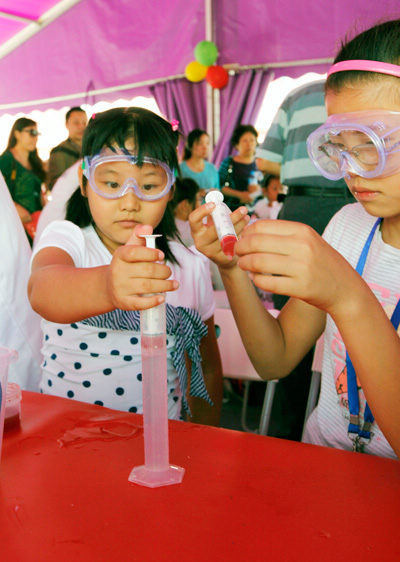|
 |
|
EXPERIMENTING: Children conduct a chemical experiment in Beijing to mark this year's Science Awareness Day on September 15 (LUO WEI) |
Children are naturally curious about the world around them. The curiosity has motivated many future scientists to decide upon their career choice.
"Half a century ago, when asked what they wanted to do in the future, many Chinese children would have answered that they would like to be scientists," said Shi Changshu, an academician with the Chinese Academy of Sciences (CAS) who received China's top science and technology award in 2010.
Unfortunately, it seems no longer the case in China today. Fewer children in the country reportedly are aspiring to become scientists when they grow up. Young people generally want to become either officials or entrepreneurs.
In recent years, many top high school graduates have chosen to study economics and business in university rather than mathematics, physics or chemistry.
In a summer camp hosted by Tsinghua University, one of China's top universities, for middle school students this year, Yuan Qingling, a second-year student from a senior high school in Hebei Province, told Beijing Youth Daily that she had never thought of becoming a scientist despite winning the top prize in a national physics competition. Yuan's cousin works in an investment bank and is highly praised by her family, so Yuan said she would like to follow her cousin's example.
The International Mathematics Olympiads is an annual international mathematical contest for pre-collegiate students. Zhan Wenlong, Vice President of the CAS, once asked five Chinese medalists what they would like to study in university. To Zhan's surprise, the five teenagers all said that they would like to study business management or finance.
Even for many young children in primary school, science is not a top choice. Two years ago, a journalist from news portal Nddaily.com interviewed first-grade primary students in Guangzhou, southern Guangdong Province, asking what they would like to be when they grow up.
After a variety of common answers such as painter, teacher or firefighter, the reporter got a shocking reply from a 6-year-old girl.
"What do you want to be when you grow up?" the reporter asked.
"I want to be an official," the girl said.
"What kind of official?" the reporter asked.
"…a corrupt official, because corrupt officials can live an extremely luxurious life," the girl replied.
After a video clip of the interview was posted online, the girl's answer sparked a heated discussion among netizens. The girl's reply, they argued, was a simple reflection of what everyone already believes about government officials.
In September 2011, the China Association for Science and Technology released the results of a survey on career objectives of primary and middle school students.
The survey involving 1,180 primary and middle school students showed that of the nine listed professions, including teacher, civil servant and scientist, the latter ranked seventh, just ahead of farmer. Civil servant ranked first.
Han Qide, chairman of the association, said that children's diversified choices reflect reality, but also found the results to be worrisome.
The survey's administer, Wang Tingda, is a researcher with the CAS. He said that a country's national prestige is ultimately measured by its strength in science and technology.
The scientist Shi warned that too few people in China are devoted to basic research. He said that although one may toil for years without making a significant breakthrough in basic research, it lays the foundation for future achievements.
Shi added that a society in which people are eager for quick success cannot be really innovative. "To build a strong country, more creative work is necessary," he said.
| 